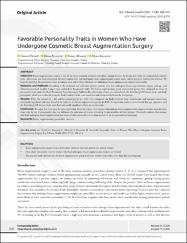| dc.description.abstract | Objective: Breast augmentation surgery is one of the most common cosmetic procedures among women. In the present study, we compared personality traits, self-esteem, and body perception between women who had undergone breast augmentation surgery and a control group of women who had not. We hypothesized that the personality traits of women who had vs those who had not undergone breast augmentation surgery would differ. Materials and Methods: According to the inclusion and exclusion criteria, patients who had undergone breast augmentation surgery and age- and education-matched, healthy women were included in the present study. The breast augmentation group and control group were compared in terms of personality traits under the Basic Personality Traits Inventory. Additionally, self-esteem, which was assessed with the Rosenberg Self-Esteem Scale, and body perception, which was evaluated using the Body Cathexis Scale, were measured and compared between the two groups. Results: When the patients (n = 80) and the control group (n = 100) were compared, the Body Cathexis Scale, extroversion, and openness scores were statistically significant and were found to be higher in the breast augmentation group (p<0.05). In regression analysis, it was found that age, openness, and the Rosenberg Self-Esteem Scale score had statistically significant effects on extroversion. Conclusion: We argue that there may be a presupposition, based on stigma, that women who undergo breast augmentation surgery are more neurotic than those who do not. Consequently, this may influence the outcomes of studies evaluating the personalities of these women. Our results indicate that women who had undergone breast augmentation had more positive personality traits than women in an un-operated control group. | en_US |



















